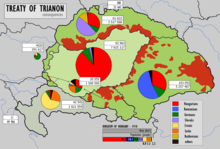Trianon syndrome


The Trianon syndrome or Trianon trauma[1] (Hungarian: Trianon szindróma or Trianon trauma) is the name given to a social phenomenon mostly occurring in Hungary. It consists of resentment about the consequences of the 1920 Treaty of Trianon and the belief that Hungary was better in the past than in the present. The Treaty of Trianon was a peace treaty signed after World War I through which the Kingdom of Hungary lost over two-thirds of its land to Austria, Czechoslovakia, Italy, the Kingdom of Serbs, Croats and Slovenes (later renamed to Yugoslavia), Poland and Romania.[1][2][3] The Trianon syndrome may also be considered as existing in some of these countries in the form of worry about Hungarian revisionism.[4]
The Trianon syndrome had great relevance in Hungary from 1920 to 1945, after which the country was occupied by the Soviet Union, and re-emerged following the end of Soviet influence in 1990, with current Hungarian society being divided between those who remain resentful about the Treaty of Trianon and those who prefer to forget it.[2] In recent years, the Trianon syndrome has been exploited by nationalist and populist politicians in Hungary, particularly by Fidesz, the ruling political party in the country, and Viktor Orbán, the current Prime Minister of Hungary. This has been done through commemorations, nationalist rallies and the raising of monuments.[1] For instance, since 2010, every 4 June is celebrated in Hungary as the Day of National Unity, originally approved with the hope of bringing Hungary closer to the Hungarian diaspora living outside of the country.[5]
Hungarian media has also suggested that the Trianon syndrome is found in Romania as well, among politicians and nationalist intellectuals. As the centenary of the signing of the treaty got closer, articles on the treaty in Romanian media increased in number. Furthermore, a Romanian politician, Titus Corlățean, pushed for the declaration of 4 June as the Trianon Treaty Day in Romania to celebrate the union of Transylvania with the country.[6] This holiday was in the end promulgated on 18 November 2020 by the then President of Romania Klaus Iohannis.[7]
The administrative division of Slovakia, which disadvantages the Hungarian minority of the country, and the non-recognition of the independence declaration of Kosovo by both Romania and Slovakia have also been attributed to the Trianon syndrome by Hungarian media.[8]
See also[edit]
References[edit]
- ^ a b c Inotai, Edit (25 November 2019). "How Hungary's "Trianon Trauma" inflates identity politics". Balkan Insight.
- ^ a b Nicholas A. Vardy, Hungary at the Encyclopædia Britannica
- ^ Traub, James (28 October 2015). "Hungary's 500-year-old victim complex". Foreign Policy.
- ^ Magyaródy, S. J. (2001). "The East-Central European Syndrome. Unsolved conflict in the Carpathian Basin" (PDF). Matthias Corvinus Publishing: 1–47.
{{cite journal}}: Cite journal requires|journal=(help) - ^ László, Róbert (13 July 2020). "The Day of National Unity in Hungary fails to unite Hungarians". Heinrich Böll Foundation.
- ^ Ambrus, Attila (8 December 2019). "Trianon-szindróma". Magyar Szó (in Hungarian).
- ^ "Legea controversată care prevede instituirea datei de 4 iunie drept "Ziua Tratatului de la Trianon" a fost promulgată de președintele Klaus Iohannis". G4 Media (in Romanian). 18 November 2020.
- ^ "Trianon és a magyar–szomszéd viszony a százéves évfordulón". Új Szó (in Hungarian). 4 June 2020.
